Salesforce Commerce Cloud Review 2025: Discover the key features, pros & cons, pricing, and real user feedback of Salesforce’s powerful e-commerce platform. Compare it with Shopify and find out if it’s the right fit for your business.
The e-commerce landscape in 2025 is more competitive than ever, and choosing the right platform can determine whether your business thrives or struggles to keep up.
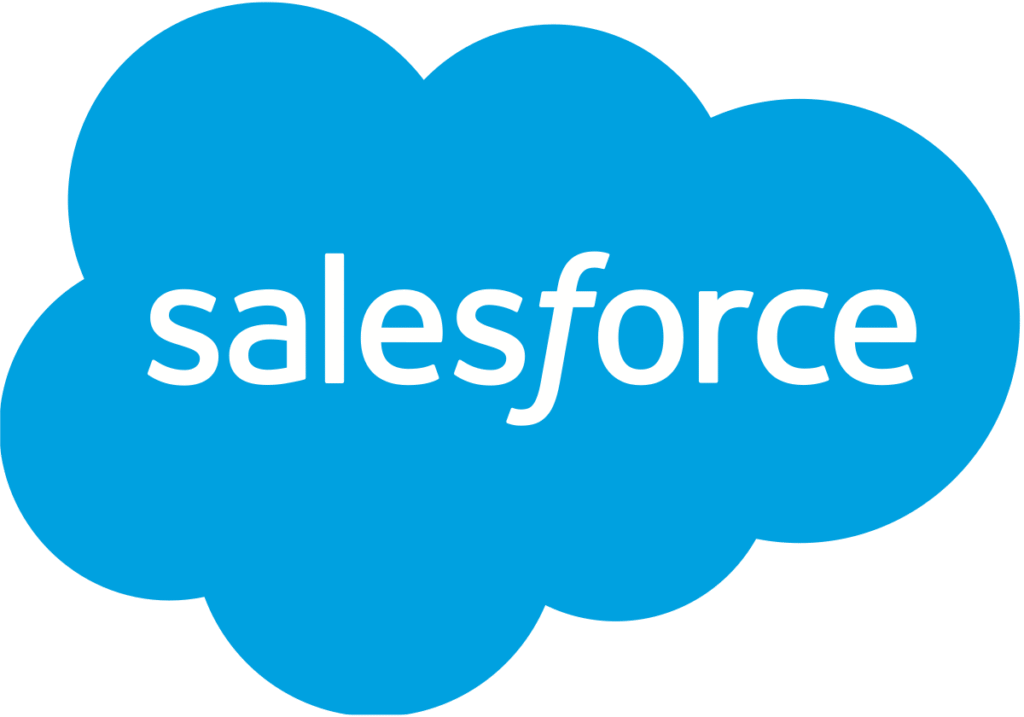
In 2025, e-commerce is no longer just about selling products online — it’s about delivering intelligent, personalized, and frictionless shopping experiences across every digital touchpoint.
But with so many e-commerce solutions available — from Shopify and WooCommerce to BigCommerce and Magento — the real question is:
Is Salesforce Commerce Cloud the right choice for your business? Or is it an overly complex system better suited for global enterprises?
In this comprehensive 2025 review, we’ll break down everything you need to know about Salesforce’s flagship e-commerce platform—from its AI-driven personalization and omnichannel capabilities to its pricing, pros & cons, and real-world performance.
Whether you’re a fast-growing mid-market brand or a global enterprise, this guide will help you decide if Salesforce Commerce Cloud is worth the investment.
Why This Review Matters
With global e-commerce sales projected to hit $7.5 trillion by 2025 (Statista), businesses need a platform that can scale, personalize, and convert at the highest level.
Salesforce Commerce Cloud promises exactly that, but it’s not for everyone. Some brands swear by its seamless CRM integration and Einstein AI, while others find it too complex and expensive compared to alternatives like Shopify Plus, Adobe Commerce, or BigCommerce.
What You’ll Learn in This Review:
✔ Key Features & 2025 Updates – What’s new in AI, headless commerce, and B2B selling?
✔ Pricing Breakdown – Is it still a six-figure investment, or are there flexible plans now?
✔ Real User Feedback – What do businesses love (and hate) about Salesforce in 2025?
✔ Salesforce vs. Competitors – How does it stack up against Shopify Plus and Adobe Commerce?
✔ Who Should (and Shouldn’t) Use It? – Is this platform right for your business size and goals?
By the end of this review, you’ll have a clear, unbiased verdict on whether Salesforce Commerce Cloud is the right choice or if another platform might better suit your needs. Let’s dive in! 🚀
What is Salesforce Ecommerce?
Salesforce Commerce Cloud is a cloud-based, AI-powered e-commerce platform designed for B2C and B2B businesses.
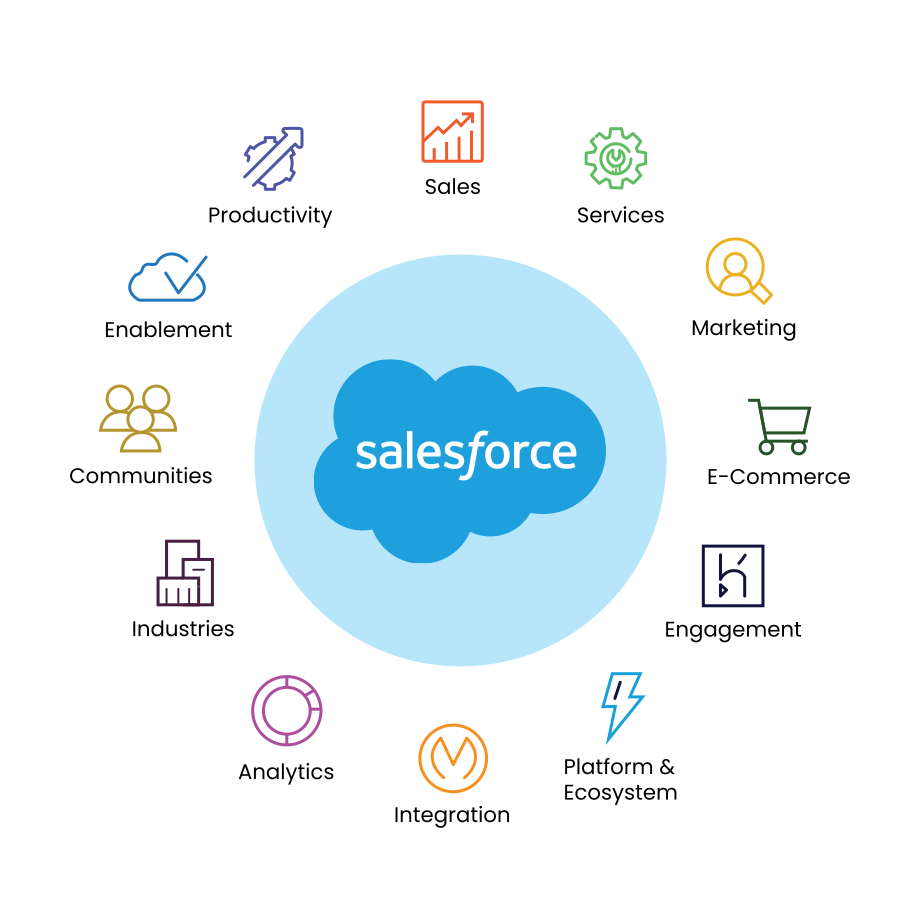
It’s part of the broader Salesforce Customer 360 suite, integrating CRM, marketing automation, and analytics into a seamless shopping experience.
🔹 Key Highlights:
Salesforce Commerce Cloud is a cloud-based e-commerce platform that enables businesses to create seamless, personalized shopping experiences across all digital channels.
It integrates with Salesforce’s broader ecosystem, including Marketing Cloud, Service Cloud, and Sales Cloud, providing a unified view of customer interactions.
- AI-Powered Personalization (Einstein AI)
- Omnichannel Selling (Web, mobile, social, in-store)
- Scalability for Enterprise Businesses
- Seamless Salesforce CRM Integration
- Headless Commerce Capabilities
According to Statista, Salesforce holds 8.4% of the global e-commerce platform market share, making it a top choice for large retailers like Adidas, Coca-Cola, and Lancôme.
🚀 Key Features of Salesforce Commerce Cloud
Salesforce Commerce Cloud (SFCC) isn’t just another e-commerce platform — it’s a comprehensive commerce solution designed to power seamless, intelligent, and scalable digital experiences.

Whether you’re in B2C, B2B, or D2C, its features go far beyond traditional storefronts. Here’s a detailed breakdown of the core features that make SFCC stand out in 2025:
1. 🤖 AI-Powered Personalization with Einstein
Salesforce Einstein is like your smart virtual sales assistant. It uses artificial intelligence and machine learning to analyze user behavior and recommend products in real-time.
- Personalized product recommendations.
- Predictive sorting (showing products based on likelihood to buy).
- Automated merchandising powered by data.
- Dynamic search results and upsells.
💡 Fact: Businesses using Einstein reported a 26% increase in conversion rates and *35% higher average order value (Salesforce, 2024).
📊 Why It Matters in 2025?
Brands using AI-driven personalization see up to 30% higher conversion rates.
72% of consumers expect personalized experiences (Salesforce Research).
2. 🌐 Omnichannel Commerce Experience
Modern shoppers expect a seamless experience — whether on mobile, desktop, social media, or in-store. SFCC enables you to deliver just that.
- Unified shopping cart and checkout across channels.
- Click-and-collect, ship-from-store, and endless aisle capabilities.
- Social media commerce integration (Facebook, Instagram, TikTok).
- Mobile-first design for responsive performance.
The platform supports a unified shopping experience across web, mobile, social, and in-store channels, ensuring consistency and convenience for customers.
📊 Why It Matters in 2025?
- 80% of shoppers use multiple channels before buying (Harvard Business Review).
- Omnichannel brands retain 89% more customers than single-channel sellers.
3. Scalability and Performance
Designed for high-volume retailers, SFCC offers robust scalability, handling significant traffic spikes during peak shopping periods without compromising performance.
📊 Why It Matters in 2025?
- 65% of B2B buyers now prefer digital self-service over sales reps (McKinsey).
4. Globalization and Localization
SFCC supports multiple languages, currencies, and localized content, enabling businesses to expand their global reach effectively.
Expanding globally? Salesforce has you covered with built-in features for cross-border commerce.
- Multiple currencies and languages
- Localized payment gateways
- International tax and compliance support
- Region-specific inventory and logistics management
📦 Stat: Over 180 countries are served by brands using Salesforce Commerce Cloud.
📊 Why It Matters in 2025?
- Headless commerce adoption has grown by 300% since 2022 (Gartner).
- PWAs improve mobile conversion rates by up to 36%.
5. Integrated Order Management
The platform provides comprehensive order management capabilities, including real-time inventory visibility, order processing, and fulfillment across various channels.
📊 Why It Matters in 2025?
- Cross-border e-commerce will hit $3.3 trillion by 2025 (Forrester).
6. 🔄 Seamless Integration with Salesforce Ecosystem
One of SFCC’s biggest advantages is how well it works with other Salesforce products:
- Marketing Cloud: For email campaigns, journeys, and segmentation
- Sales Cloud: CRM tools to close more deals
- Service Cloud: Customer support and live chat
- Experience Cloud: Build branded customer portals
This unified approach helps you create cohesive and personalized journeys from the first click to post-purchase support.
📊 Why It Matters in 2025?
- Companies using CRM integrations see 41% higher revenue growth (Nucleus Research).
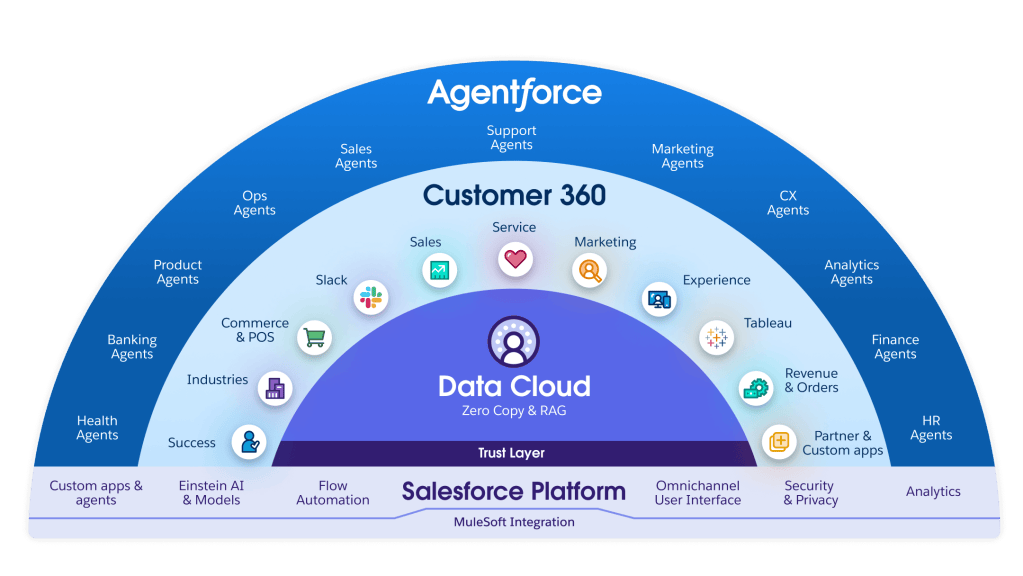
💰 Salesforce Commerce Cloud Pricing Plans (2025)
| Plan | Pricing Model | Best For | Key Features |
|---|---|---|---|
| Starter (B2C Commerce) | % of Gross Merchandise Value (GMV) (Typically 1–3%) | Mid-market B2C retailers | Cloud hosting, product catalog, promotions, basic AI tools, mobile-optimized UX |
| Growth (B2C + B2B Commerce) | Custom Quote | Growing B2C & B2B brands | Headless commerce, Einstein AI, advanced APIs, international support |
| Plus (Unified Commerce) | Custom Quote | Large enterprises and omnichannel brands | Personalized experiences, multi-storefronts, CRM integrations, 24/7 support |
| Commerce for B2B | Custom Quote | Manufacturers, wholesalers | Contract pricing, account hierarchies, complex workflows, self-service portals |
| Headless Commerce (API-first) | Custom Quote | Tech-driven businesses & developers | Flexible front-end, APIs, Commerce SDK, scalable architecture |
| Add-ons | Based on usage | Any plan | Marketing Cloud, Service Cloud, Experience Cloud, Tableau CRM, Loyalty Programs |
✅ Advantages of Salesforce Commerce Cloud
- Comprehensive Ecosystem: Integration with Salesforce’s suite of products provides a unified platform for managing customer relationships, marketing, and sales.
- Advanced Personalization: Einstein AI enhances customer experiences through tailored recommendations and predictive analytics.
- Global Reach: Robust localization features support international expansion and cater to diverse markets.
- Scalability: Designed to handle high traffic volumes, making it suitable for large enterprises.
❌ Disadvantages of Salesforce Commerce Cloud
- Complex Implementation: Requires technical expertise for setup and customization, potentially leading to longer deployment times.
- Cost: The revenue-based pricing model can be expensive, especially for businesses with high sales volumes.
- Learning Curve: The platform’s complexity may necessitate extensive staff training.
- Limited Third-Party Integrations: While integration within the Salesforce ecosystem is seamless, connecting with external applications may require additional development.
Pros & Cons of Salesforce Ecommerce
| Pros 👍 | Cons 👎 |
|---|---|
| AI-driven personalization | Expensive for small businesses |
| Seamless CRM integration | Steep learning curve |
| Enterprise-grade scalability | Custom pricing (no fixed plans) |
| Strong omnichannel support | Requires technical expertise |
| Excellent customer support | Slower setup than competitors |
📊 Salesforce Commerce Cloud vs. Shopify: A Comparative Analysis
To help you make an informed decision, here’s a side-by-side comparison of Salesforce Commerce Cloud and Shopify:
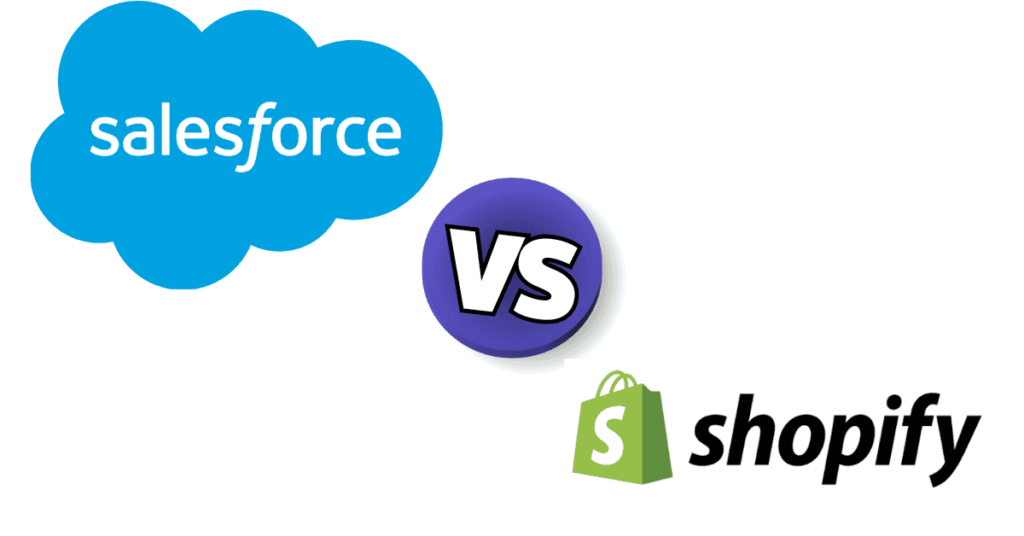
| Feature | Salesforce Ecommerce | Shopify Plus |
|---|---|---|
| Pricing | Custom ($50K+/year) | Starts at $2,500/month |
| Best For | Large enterprises | Mid-market & scaling brands |
| Ease of Use | Complex, needs dev support | User-friendly, low-code |
| AI Capabilities | Einstein AI (Advanced) | Basic AI via apps |
| CRM Integration | Native Salesforce CRM | Requires third-party apps |
| Global Selling | Multi-currency, tax compliance | Limited without plugins |
| Speed of Deployment | 6+ months (custom builds) | Weeks to launch |
| App Ecosystem | Limited (Salesforce-focused) | 8,000+ apps in Shopify Store |
🔹 Which One Should You Choose?
- Salesforce → Best for enterprises needing deep CRM integration & AI personalization.
- Shopify Plus → Best for fast-growing brands wanting quick setup & ease of use.
📈 Market Presence and Adoption
As of 2025, Salesforce Commerce Cloud holds a market share of approximately 0.02% in the e-commerce platform market.
Notably, 21.1% of Salesforce Commerce Cloud stores are based in the United States, indicating a strong presence in the North American market.
User Feedback & Case Studies
⭐ Positive Reviews:
- “Einstein AI boosts conversions by 20% with smart recommendations.” – Retail Brand
- “Perfect for global businesses with complex workflows.” – B2B Manufacturer

⚠️ Negative Reviews:
- “Too expensive for small businesses.” – E-commerce Startup
- “Implementation takes too long.” – Mid-sized Retailer
📌 Case Study: Adidas saw a 40% increase in online revenue after migrating to Salesforce Commerce Cloud.
🤔 Is Salesforce Commerce Cloud Right for You?
Consider Salesforce Commerce Cloud if:
- You’re a large enterprise seeking a scalable, customizable e-commerce solution.
- Integration with Salesforce’s CRM and marketing tools is a priority.
- You require advanced AI-driven personalization and analytics.
Consider Alternatives if:
- You’re a small to medium-sized business with limited technical resources.
- Budget constraints make a revenue-based pricing model less feasible.
- You prefer a more straightforward, user-friendly platform with quick setup.
🛒 Salesforce Commerce Cloud Review 2025:
Frequently Asked Questions (FAQs)

Q1: How does Salesforce Commerce Cloud’s pricing work?
A: SFCC uses a revenue-based pricing model, charging a percentage of gross merchandise value (GMV). This can be cost-effective for some businesses but may become expensive as sales volume increases.
Q2: Can SFCC integrate with non-Salesforce applications?
A: While SFCC integrates seamlessly within the Salesforce ecosystem, connecting with third-party applications may require additional development and customization.
Q3: Is Salesforce Commerce Cloud suitable for B2B e-commerce?
🧩 A: Yes, Salesforce offers B2B Commerce, specifically designed for manufacturers, wholesalers, and distributors. It includes features like bulk ordering, contract pricing, account hierarchies, and reordering, making it ideal for business-to-business transactions.
Q4: Does Salesforce Commerce Cloud support headless commerce?
🧠 A: Absolutely. SFCC supports headless architecture, allowing developers to use modern front-end frameworks (like React or Angular) while SFCC handles back-end commerce operations. This offers flexibility in building unique and high-performing customer experiences.
Q5: How long does it take to implement Salesforce Commerce Cloud?
⏳ A: Implementation time can vary based on business complexity, integrations, and customization requirements. On average, large-scale deployments can take 4 to 6 months.
📢 Why Should You Choose Salesforce Commerce Cloud?
Salesforce Commerce Cloud isn’t just another e-commerce platform — it’s a complete digital transformation suite. Here’s why it stands out:
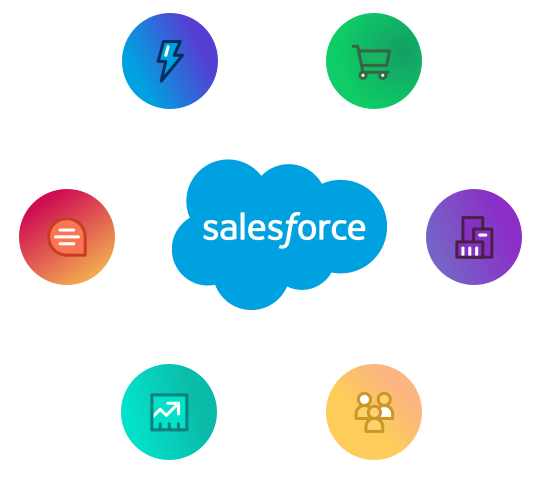
- 🧠 Built-in AI for smarter selling
- 🌍 Enterprise-grade globalization tools
- 🔄 Seamless integration with the world’s #1 CRM
- 📈 Advanced analytics and reporting tools
- 🔧 High flexibility for customization
- 🧰 Built-in tools for A/B testing, merchandising, and promotions
- 🧭 Strong partner ecosystem and developer support
📌 Review Rating Table
| Category | Rating (Out of 5) |
|---|---|
| Features | ⭐⭐⭐⭐⭐ |
| Customization | ⭐⭐⭐⭐☆ |
| Ease of Use | ⭐⭐☆☆☆ |
| Integration | ⭐⭐⭐⭐⭐ |
| Performance | ⭐⭐⭐⭐☆ |
| Customer Support | ⭐⭐⭐⭐☆ |
| Value for Money | ⭐⭐⭐☆☆ |
⭐ Final Verdict: Is Salesforce Commerce Cloud Worth It in 2025?
If you’re a large business or enterprise looking to scale globally, personalize at scale, and unify your commerce, sales, and marketing, Salesforce Commerce Cloud is undoubtedly a top-tier choice.
Its deep integration with the broader Salesforce ecosystem gives it a competitive edge that few platforms can match.
👍 Who Should Buy It?
- Large enterprises need AI, CRM integration, and global scalability.
- B2B sellers with complex pricing models.
- Brands already using Salesforce CRM.
👎 Who Should Avoid It?
- Small businesses (too expensive).
- Beginners (steep learning curve).
- Those needing a quick setup (Shopify Plus is faster).
🔹 Final Rating: 4.0/5
Salesforce Commerce Cloud is a powerful but pricey solution best suited for enterprises that need deep customization and AI-driven commerce.
However, if you’re a startup or small-to-medium-sized business, the platform’s cost, complexity, and learning curve may outweigh its benefits. In such cases, Shopify or BigCommerce might be more cost-effective and user-friendly alternatives.
Pingback: SAP Commerce Cloud Review 2025: Is It the Right Enterprise E-commerce Platform for You? - Review Xpresso
Wow, marvelous weblog structure! How long have you ever been running a blog for? you make running a blog glance easy. The overall look of your web site is wonderful, as smartly as the content material!
I am genuinely thankful to the owner of this web page who has shared this fantastic post at here.
Hi there, just became alert to your blog through Google,and found that it is truly informative. I am gonna watch outfor brussels. I’ll be grateful if you continue this in future.Lots of people will be benefited from your writing.Cheers!
Have you ever considered about including a little bit more than just your articles? I mean, what you say is fundamental and all. However imagine if you added some great images or video clips to give your posts more, “pop”! Your content is excellent but with images and clips, this website could undeniably be one of the best in its field.
Hello very nice web site!! Man .. Beautiful .. Amazing .. I will bookmark your site and take the feeds also? I am satisfied to seek out so many useful information here in the put up, we want work out extra techniques on this regard, thank you for sharing.
Aw, this was a very nice post. Taking the time and actual effort to create a great article… but what can I say… I hesitate a whole lot and never seem to get nearly anything done.
Thank you for the auspicious writeup. It in fact was a amusement account it. Look advanced to far added agreeable from you! By the way, how could we communicate?
It’s actually very complex in this busy life to listen news on TV, so I just use world wide web for that reason, and get the newest news.
Wow! This could be one particular of the most helpful blogs We’ve ever arrive across on this subject. Actually Excellent. I am also an expert in this topic therefore I can understand your effort.
Greetings! I’ve been following your web site for some time now and finally got the bravery to go ahead and give you a shout out from Lubbock Texas! Just wanted to tell you keep up the fantastic job!
I am not sure where you are getting your info, but good topic. I needs to spend some time learning more or understanding more. Thanks for excellent info I was looking for this information for my mission.
Have you ever thought about adding a little bit more than just your articles? I mean, what you say is valuable and everything. Nevertheless think about if you added some great pictures or video clips to give your posts more, “pop”! Your content is excellent but with pics and videos, this site could certainly be one of the best in its niche. Terrific blog!
you are really a good webmaster. The website loading speed is amazing. It seems that you are doing any unique trick. Also, The contents are masterpiece. you have done a wonderful job on this topic!